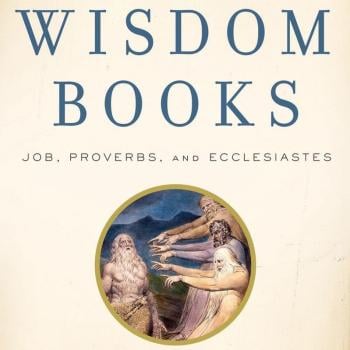Chapter Three of Tom Wright’s magnum opus is a first rate summary of Greek philosophy insofar as it has relevance to understanding the thought world and writing of Paul. Particular focus is given to Stoicism (including helpful discussions of Seneca and Epictetus of course). Such a precis is important because, as Tom stresses, Paul believed he was offering an essentially Jewish message to a largely pagan world (p. 200) and he wanted it to be a word on target, a persuasive word. The one thing I wish could have been included in this chapter was a discussion of the interface between philosophy and rhetoric as it has a bearing on the understanding of Paul. After all, Aristotle himself was not only the father of much subsequent philosophy, he was the father of rhetoric in various ways as well and saw the latter as the proper way to present the former.
One of the reasons this sort of background chapter is important is to remind us that while in the modern era we often separate politics and religion, this was hardly the case in antiquity, and it is often a mistake to treat ‘religion’ as if it were something hermetically sealed off from the social world and political life of the Empire. To the contrary, religion, especially in the case of the Emperor cult, was an expression of politics in Paul’s world. As Tom puts it “religion was what kept the wheels of the state turning in the right direction” (p. 203). And what Paul was preaching would have sounded more like a philosophy than a religion (bereft as it was of temples, priests, and literal sacrifices). “Saul of Tarsus was born into a world where eight hundred years of Hellenic culture was alive and well, and where, in particular the philosophies of four centuries earlier were making a considerable come-back” (p. 211). This was especially true of Stoicism, the classic form of pantheism.
Tom draws interesting analogies between Deism in the modern west and ancient Epicureanism, in that the vision of god or the gods in the latter involved remote deities not much interesting in dirtying their hands with the affairs of humankind. Interestingly, he then adds “whereas the default mode of most westerners is some kind of Epicureanism [not only in regard to the remote deity bit, but also in regard to the living a self-centered life in pursuit of certain kinds of pleasure and happiness], the default mode for many of Paul’s hearers was some kind of Stoicism” (p. 213)… i.e. that God was everywhere and in all things as the sort of guiding force, elan vitale, essential spirit of it all. A Stoic might have said ‘if it’s all god, then its all good’ and what seems to be evil is mere lack of understanding on our part. The Epicurean by contrast sees much in the world that is genuinely evil and retreats to his garden, his safe spot, his sanctuary to dedicate himself to true pleasure— life, liberty, the pursuit of happiness.
“The aim of the Stoic was to engage in a progress [I think he means process] of continual moral enlightenment, with the goal of becoming a sage, a truly wise, well-formed character, able to live in accord with nature…in this divine sense becoming self-sufficient, impervious to the nasty tricks which life can play” (p.214). The Stoics saw our senses as basically reliable so one could make sense of the world to a good degree, where as the Skeptics felt the human senses were basically unreliable. For the essentially theological nature of Stoic thought, see p. 217 (and here Wright differs strongly from the analysis of folk like Engberg-Petersen, as do I).
There is a nice series of quotations from Epictetus in this chapter including the remarkable peon of praise where Epictetus insists that the ‘chief end and aim of humankind should be to praise god’ (see pp. 226-227). Here again Wright differs from Engberg Petersen in saying that theology is right at the heart of Epictetus’ exposition of Stoicism, and he is correct about this. The attempt to denude Stoicism or Paulinism of theology is an exercise in futility. Tom concludes that Paul would have assumed that the default mode of most of his audience’s thought would have been the Stoic development of Platonic thought (p. 232).
As a sort of precursor to what we find in Paul (which is an interesting blend of Jewish thought in Hellenic thought forms and modes of expressions) Tom fruitfully explores the Wisdom of Solomon where essentially Jewish thought is expressed in ways user friendly for a world long since Hellenized.
This is my favorite chapter thus far in this book and I will use it as a summary of important data for my students.

















